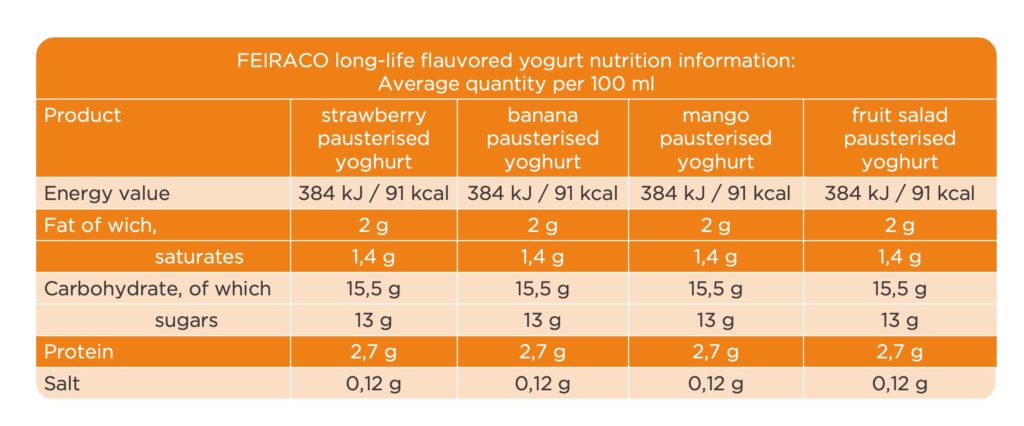Composition of cow’s milk per 100 ml
WHAT IS MILK?
Milk is a very complete food because it contains calcium, phosphorus, magnesium and protein, which are essential for development and growth. Adequate milk consumption during all stages of human development helps maintain strong bones and muscles and prevent associated diseases in adulthood.
Milk is a source of proteins of high biological value, as it contains all the essential amino acids, even above the amounts set by the benchmark international standard for protein.
In addition, milk contains bioactive peptides, with scientifically proven benefits for the immune, cardiovascular and digestive systems.
It is the main dietary source of calcium, not only due to the high content of this mineral, but also its high bioavailability thanks to other components of milk: vitamin D, proteins, phosphorus, etc.
It is rich in vitamin A, especially important in growth, development, immunity and eye health.

WHAT IS MILK'S COMPOSITION?
Lactose is the main carbohydrate (98%) contained in milk and due to the action of acidifying bacteria it is converted to lactic acid, obtaining fermented milk and yoghurt as the end product. In order to be digested it requires lactase, an enzyme that is secreted in the small intestine. If there is a deficit or decrease in the production of this enzyme, the lactose will not be absorbed or digested properly to the extent of producing characteristic diarrhoea, which is the primary sign of lactose intolerance.
In addition, milk contains proteins of high biological value. Such as casein (78% of total protein), from which rennet is obtained, and serum proteins (17% of total protein) from which we obtain curd or fresh cheese. It also contains many enzymes such as lipases (responsible for the rancid taste and smell), proteases (responsible for the curd formation) and alkaline phosphatases (indicator of correct pasteurisation).
- Carbohydrates: 4.6
- Protein: 3.1
- Casein: 2.80
- Albumin: 0.70
- Lactose: 4.9
- Total fat: 3
- Ash: 0.75
- Dry residue: 11.7
- Water: 87.0

WHY CONSUME DAIRY PRODUCTS ON A DAILY BASIS?
The current food pyramid recommends eating 2 to 4 servings of dairy products a day. Dairy products include milk, yoghurt and cheese. Milk has a high content of water, high-quality protein, carbohydrates (lactose) and is low in fat. It is a source of vitamins A, E and K and minerals like calcium, phosphorus and sodium. It contains small amounts of vitamin C and iron. It is advised to consume at least one glass of milk a day. Semi-skimmed or skimmed milk is healthier.
Yoghurt is obtained by adding enzymes, which break the lactose down into lactic acid, to boiled whole, semi-skimmed or skimmed milk. Its nutritional value is similar to milk but it has a lower lactose content. It is advisable to consume 2 yoghurts a day.
Yoghurt contains probiotics, which are live microorganisms that interact with the intestinal microflora or cells of the intestinal mucosa and their actions are: balancing the intestinal flora, protecting against gastrointestinal infections and diarrhoea and increasing defences, as they improve the immune response.
Cheese is a fresh or matured, solid or semi-solid product obtained from separating the serum after coagulating milk using rennet or another coagulant. Cheese has a high nutritional value because it contains calcium and vitamins A, B2, B12 and D. It has a low carbohydrate content and it decreases as the maturity of the cheese increases. Its fat content varies according to the type and curing of the cheese.
More information at www.inlac.es

WHY CONSUME DAIRY PRODUCTS THROUGHOUT LIFE?
Pregnancy and breast feeding
Many of the nutrients in milk are required during this stage, such as proteins, phosphorus, magnesium, vitamin B12, riboflavin, folic acid and calcium. Consumption of up to 3 servings of dairy products during pregnancy, and up to 5 when breast feeding can meet these requirements.
Children and adolescents
During this stage consumption of calcium and iron is essential and will help keep bones and teeth in good condition.
Children under 11 should consume 3 servings of dairy products a day, and older children, 3 or 4 a day. It is advisable to opt for semi-skimmed milk because it contains less saturated fat. Only children under 5 years old should drink whole milk.
Adults
Milk plays an important role in maintaining health and preventing chronic diseases. Milk and dairy products are among the products that provide the highest amounts of easily absorbable calcium. As peak bone mass is not reached until the third decade of life, it is especially important for adults to meet the calcium, protein and vitamin D requirements, in order to prevent osteoporosis. Lack of oestrogen in postmenopausal women prevents the absorption and retention of calcium so it is necessary to cover this deficit with food.






